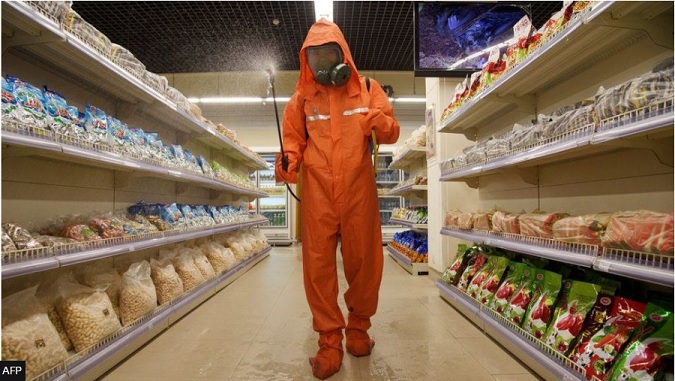
North Korea has ordered a strict national lockdown after confirming its first official Covid infections.
State media have reported an Omicron outbreak in the capital, Pyongyang, but did not state the number of cases.
KCNA said leader Kim Jong-un had vowed to eradicate the outbreak, which it called a "severe national emergency" that had breached the country's "quarantine front".
But observers believe the virus has long been present in the country.
Outsiders say the nation's 25 million population is vulnerable as North Korea has declined to administer a Covid-19 vaccine programme, even rejecting offers from the international community to supply millions of AstraZeneca and Chinese-made Sinovac jabs last year.
There have also been concerns about North Korea's impoverished healthcare system.
North Korea's main way of combating Covid has been to seal its foreign borders - it was one of the first countries to do so, in January 2020.
But this has also stopped essential supplies from entering the country, which has led to food shortages and a cratering economy.
On Thursday, KCNA said Mr Kim had ordered "maximum emergency" virus controls, which appeared to include orders for localised lockdowns and gathering restrictions in workplaces.
The North Korean news outlet added that the first case of the Omicron variant had been reportedly detected in the capital four days ago.
Residents in some areas of Pyongyang had been subjected to lockdown for at least two days before the latest announcement, according to NK News, a Seoul-based monitoring site.
South Korea's government said it has renewed its offer of humanitarian assistance to the North in response to the news of the outbreak. Pyongyang has yet to respond.
For more than two years, North Korea has, rather dubiously, claimed not to have a single case of Covid-19. So why admit to it now?
Most likely it is because this outbreak is too serious and too difficult to hide.
North Korea has been consistent in its public commitment to fighting the virus. This is how it has justified closing its borders for so long. Now that Omicron has entered the country, the challenge is to limit its spread.
With no vaccines, poor healthcare and a limited capacity to test people, North Korea's options are very limited right now.
Authorities have clearly decided they have no choice but to put the country into lockdown. In order to do this, they simply have to tell people and the rest of the world.
It does not necessarily mean they will be any more willing to accept outside help.

